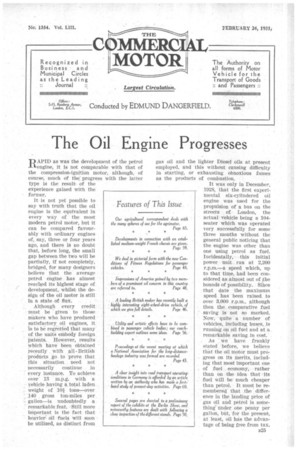The Oil Engine Progresses
Page 43

If you've noticed an error in this article please click here to report it so we can fix it.
RAPID as was the development of the petrol XI/engine, it is not comparable with that of the compression-ignition motor, although, of course, much of the progress with thelatter type is the resultof the It is not yet possible to say with truth that the oil engine is the equivalent in every way of the most modern petrol motor, but it can he compared favourably with ordinary engines of, say, three or four years ago, and there is no doubt that, before long, the small gap between the two will be partially, if not completely, bridged, for many designers believe that the average petrol engine ha A almost reached its higheq stage of development, whilst the design of the oll motor is still In a state of flux.
Although every credit must be given to those makers who have produced satisfactory oil engines, it Is to be regretted that many of the units embody foreign Patents. However, results Which have been obtained recently with ailBritish products go to prove that this situation, need not necessarily continue in every. instance. To achieve over 13 m.p.g. with a yehicle having a total laden weight of 101 tons—over 140 gross ton-miles per gallon—is undoubtedly a remarkable feat. 'Still more important is the fact that heavier Oil fuels will soon be utilized, as distinct from gas oil and the lighter Diesel oils at present employed, and this without causing difficulty in starting, or exhausting obnoxious fumes as the products of combustion.
It was only in December, 1928, that the first expert mental six-cylindered oil engine was used for the propulsion of a bus on the streets of London, the actual vehicle being a 104seater which was operated very successfully for some three months without the general public noticing that the engine was other than one using petrol as fuel. Incidentally, this initial power unit. ran at 2,200 .SpeOd which, up to. that time, had been considered as-almost out of lthe bounds of possibility.., Mace that • date the . • maximum speed. has been raised. to over 3,000 r.p.m., although then the, comparative fuel saving • is not so marked. Now, • 'quite a number of vehicles, including buses, ,is running on ail fuel and at a remarkable saVing in cost. As we have • frankly stated before, we believe that the oil.niotor must progress on its Merits, including that most important one of fuel economy,'rather than on the idea. that .its fuel will .be • much cheaper than petrol. It must be Memberedthat the difference in the landing Price Of gas Oil and .petrol is sortiething` under..o.ne penny per gallon, but„:fer the present-, at least, oil 'has the advantage of being free from tax.




















































































































